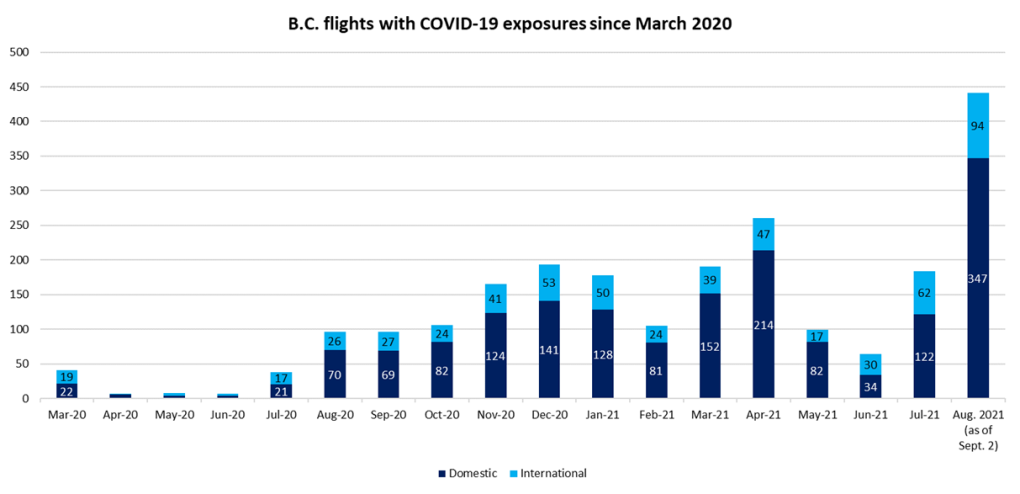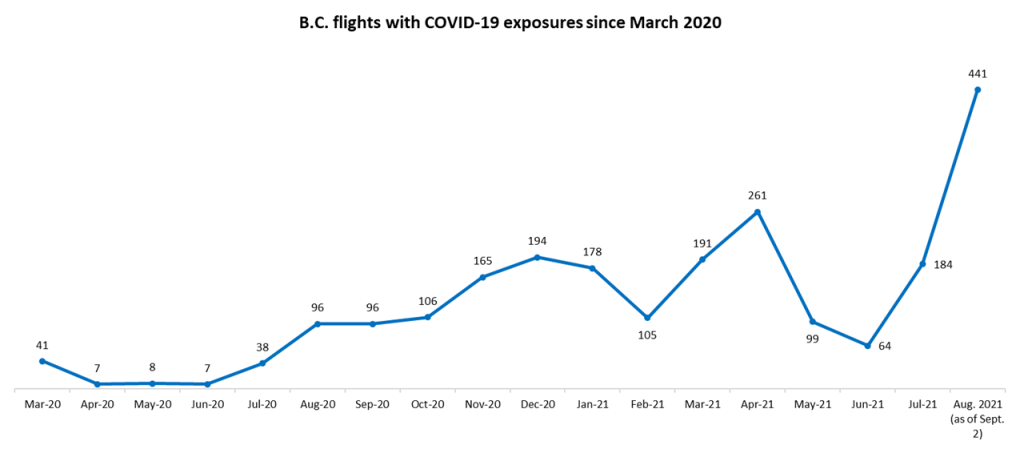A record-breaking 441 flights were added to B.C.'s COVID-19 exposures list in August
A record number of flights with COVID-19 cases on board passed through B.C. airports in the month of August, according to data from the B.C. Centre for Disease Control.
As of Thursday, the centre had published 441 exposure notices for flights that took off from or landed at B.C. airports last month, with more August flights likely to be added in the coming days as the BCCDC learns of more travellers' positive tests.
The previous record for flight exposure notifications in a month was set in April, when 261 planes with the coronavirus on board passed through B.C. airports.
Details on all of the recent flights, including passenger rows considered to be at greatest risk, can be found on the BCCDC website.
The number of exposures in August is also a stark increase from the 184 flights the BCCDC warned about in July.
As it has in the past, the rising number of flight exposures corresponds to rising caseloads in B.C., as the pandemic's Delta-variant-fuelled fourth wave leads to reimposed restrictions and the implementation of vaccine passports in the province.
While the surge in cases - and the surge in flight exposures - has been significant, a Vancouver infectious disease specialist said the volume of COVID-19 exposures at B.C. airports is less of an issue than the precautions taken to ensure safe travel.
"We currently live in a world of COVID," said Dr. Brian Conway, medical director of the Vancouver Infectious Diseases Centre.
"It is highly likely that we will live in a world of COVID for the foreseeable future, so these (flight exposures) are occurrences that will happen on an ongoing basis. They will not, not happen."
Knowing this, the most important precautions to take are requiring that all air travellers be fully vaccinated against COVID-19, and requiring that they provide a recent negative test for the disease before boarding their flights, Conway said.
The federal government has required international travellers to provide a negative test before boarding Canada-bound flights since early January, but no such requirement exists for domestic travel.
Similarly, fully vaccinated travellers who are eligible to enter Canada - a group that currently includes people travelling for essential reasons, as well as vaccinated Americans travelling for recreation - are exempt from the federal government's 14-day quarantine requirement.
The federal government has said it plans to require domestic air travellers to show proof of vaccination before boarding their flights, but those rules have not yet been implemented - and may not ever be, depending on the outcome of the ongoing federal election.
Most of the flights added to the exposures list in August were domestic.

Conway described vaccine and negative test requirements as "reasonable procedures" that should be in place alongside mask requirements on all flights.
"We're not going to wait years until there is no COVID to start flying again," he said. "That's not reasonable. So I think that going forward this is how we construct the new universe. But the premise of all of this for us all to understand is that COVID is not going away."

As for the at least 441 flights that took off from or landed at B.C. airports in August and had a case of COVID-19 on board, Conway said more information about the total number of flights in the province during the month would be necessary to put the number in context.
Travel has increased as pandemic-related restrictions have loosened, but the most recent data on the number of flights passing through B.C.'s busiest airport - Vancouver - is from June, before the province entered Step 3 of its restart plan.
Without knowing the total number of flights that passed through B.C. airports in August, it's hard to say how significant the increase to 441 public exposure notices in a single month is, Conway said.
"As long as appropriate public health measures were taken as a reaction to each and every one of these several hundred cases that were reported, then the system did its job," he said.
"But, going forward, we need to do our job probably more efficiently, and my sense is that would lead to a decrease in the number of reported cases, but it won't ever be zero. Not in the foreseeable future."
For people who have been on a flight that ended up on the BCCDC's exposure list, Conway has some simple advice: Get tested.
And, for those concerned about returning to the skies when the coronavirus is circulating so widely, he reiterated that there's going to be some risk of getting COVID-19 no matter what, at least over the next few years.
"If individuals are waiting to get on an airplane until it's absolutely, 100 per cent safe, and that's the criteria that they will use, I respect that," Conway said. "But, in making that decision, you are essentially deciding that you will not take an airplane probably for the next year or two."
CTVNews.ca Top Stories

DEVELOPING Person on fire outside Trump's hush money trial rushed away on a stretcher
A person who was on fire in a park outside the New York courthouse where Donald Trump’s hush money trial is taking place has been rushed away on a stretcher.
Mandisa, Grammy award-winning 'American Idol' alum, dead at 47
Soulful gospel artist Mandisa, a Grammy-winning singer who got her start as a contestant on 'American Idol' in 2006, has died, according to a statement on her verified social media. She was 47.
She set out to find a husband in a year. Then she matched with a guy on a dating app on the other side of the world
Scottish comedian Samantha Hannah was working on a comedy show about finding a husband when Toby Hunter came into her life. What happened next surprised them both.
'It could be catastrophic': Woman says natural supplement contained hidden painkiller drug
A Manitoba woman thought she found a miracle natural supplement, but said a hidden ingredient wreaked havoc on her health.
Young people 'tortured' if stolen vehicle operations fail, Montreal police tell MPs
One day after a Montreal police officer fired gunshots at a suspect in a stolen vehicle, senior officers were telling parliamentarians that organized crime groups are recruiting people as young as 15 in the city to steal cars so that they can be shipped overseas.
Vicious attack on a dog ends with charges for northern Ont. suspect
Police in Sault Ste. Marie charged a 22-year-old man with animal cruelty following an attack on a dog Thursday morning.
Senators reject field trip to African Lion Safari amid elephant bill study
The Senate legal affairs committee has rejected a motion calling for members to take a $50,000 field trip to the African Lion Safari in southern Ontario to see the zoo's elephant exhibit.
Tropical fish stolen from Beachburg, Ont. restaurant found and returned
Ontario Provincial Police have landed a suspect following a fishy theft in Beachburg, Ont.
DEVELOPING G7 warns of new sanctions against Iran as world reacts to apparent Israeli drone attack
Group of Seven foreign ministers warned of new sanctions against Iran on Friday for its drone and missile attack on Israel, and urged both sides to avoid an escalation of the conflict.
































